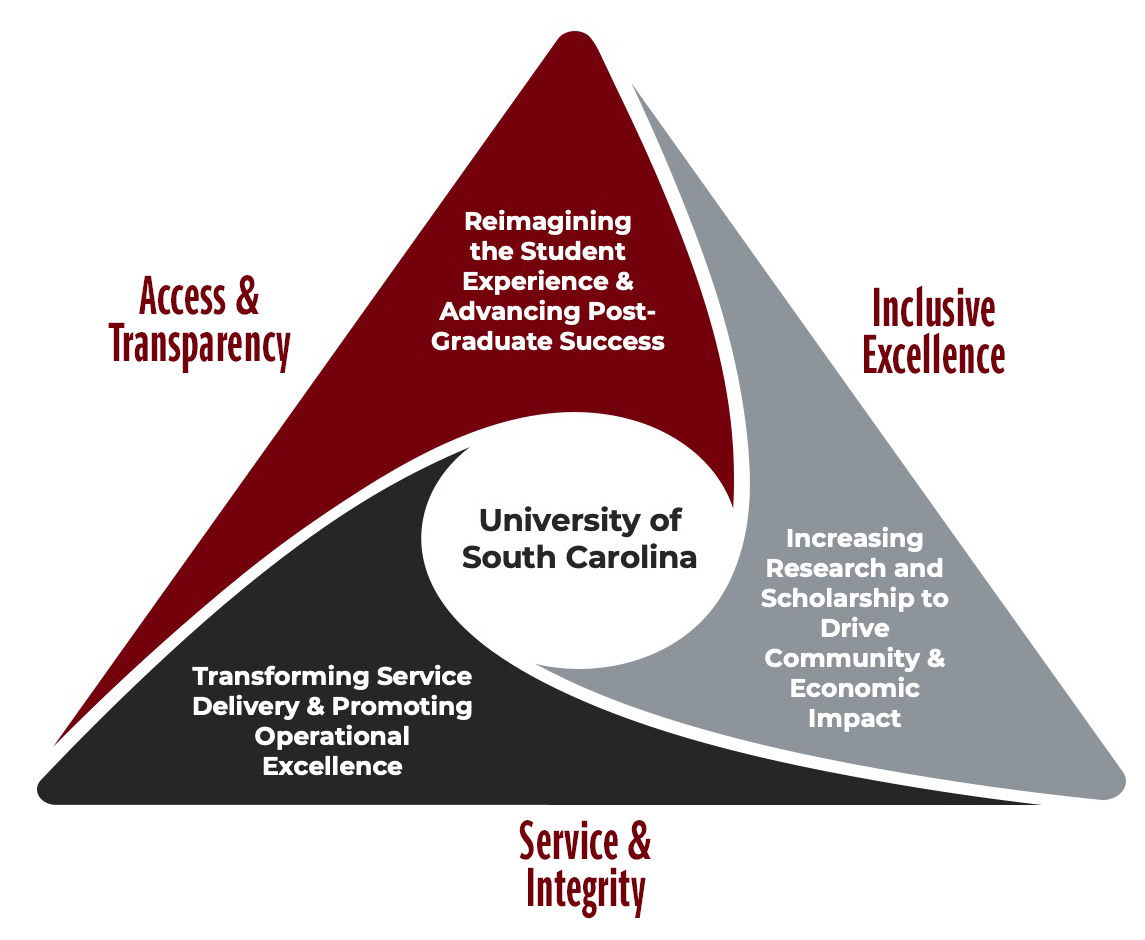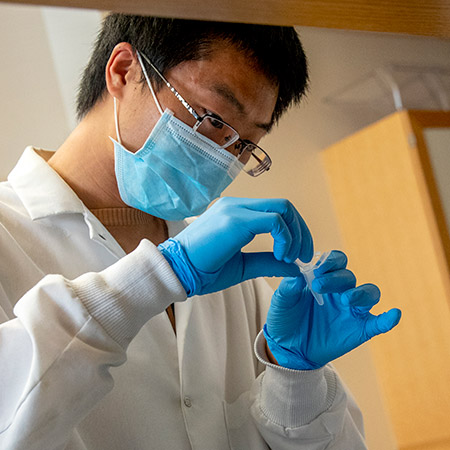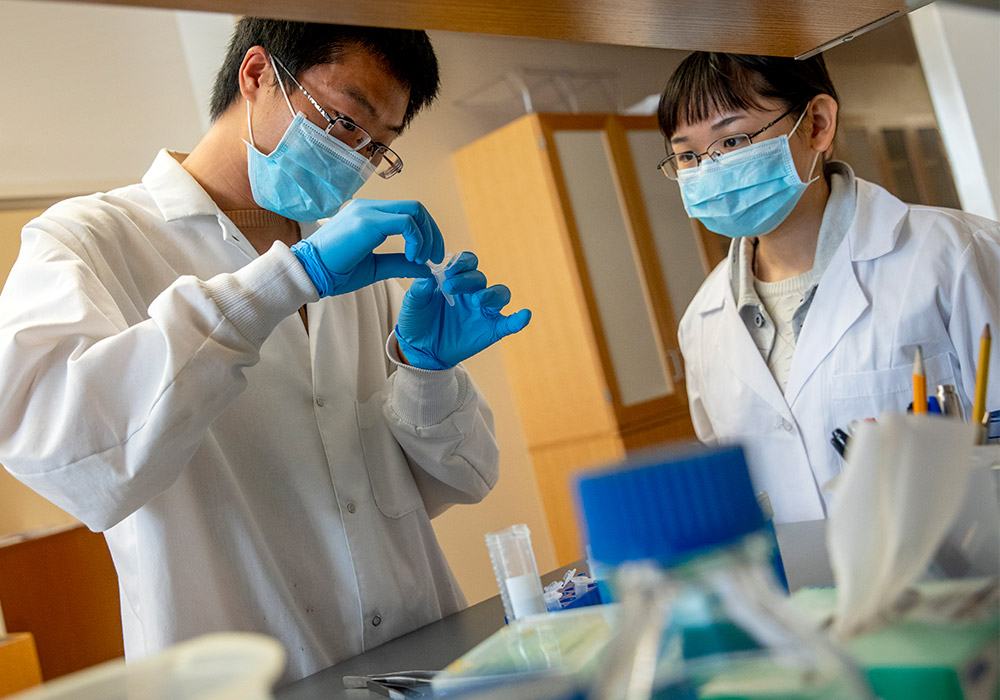
Strategic Priorities2023-2028
Established in 1801, the University of South Carolina has celebrated centuries of success, strengthening our university and sustaining our prominence as one of the nation’s oldest and most comprehensive public universities.
USC draws on this centuries-long experience and the creative thinking, dedication, and impact of our faculty and staff to offer an impressive and accessible portfolio of courses, programs, activities, and research endeavors to best serve our community, our state, and our nation.
As one of the leading flagship universities in the nation, USC serves a diverse population of undergraduate and graduate students, offers a wide range of nationally and internationally ranked academic programs, and engages world-class research and faculty members. Our community encompasses engaged learners, leading educators, and dedicated staff and administrators who are committed to pursuing knowledge and solving important societal and economic challenges. At the heart of USC’s mission lies our commitment to the state of South Carolina and to promoting the value of knowledge, fostering cultural enrichment, and strengthening quality of life in our state. Grounded in this commitment, we will continue our growth and serve our community for centuries to come.
USC unveiled its most recent strategic plan, For South Carolina: A Path to Excellence, in 2020. This broad and ambitious plan was thoughtfully crafted by USC faculty, staff, and students during a critical juncture in higher education. The nation was in the midst of the COVID-19 pandemic and higher education institutions across the country were dealing with a myriad of challenges related to funding and maintaining operations as usual, all while prioritizing the health and well-being of their community members. During this time, the USC community aligned on a strategic plan that articulated our mission and vision and a set of eight strategic priorities. USC’s priority areas included cultivating the best students and world-class faculty and staff, fostering outstanding research and community partnerships, and other ambitious goals. This comprehensive strategic plan detailed a path forward and expressed our aims for the future, including 25 goals, 71 objectives, 185 programs, and 260 metrics. Since this plan was broad and applicable to so many facets of important work, it resonated with many of our dedicated community members.
In the last three years, our institution has welcomed new leadership, presenting an opportunity to sharpen our near-term strategic focus. Our leadership stands by and values the priorities included in the 2020 strategic plan and will continue to further our important work in those areas. Each priority reflects our foundational values of Access and Transparency, Inclusive Excellence, and Service and Integrity, which are also at the core of our Carolinian Creed. However, through this document, we seek to establish increased clarity and alignment regarding USC’s near-term goals and reinforce our commitment to inclusive excellence. Our near-term priorities include:

-

Student Experience
As undergraduate and graduate students are at the center of USC’s mission, the Reimagining the Student Experience and Advancing Post-Graduate Success priority underscores our commitment to continuing to empower our students and to offering them high-quality educational and co-curricular experiences.
-

Research and Scholarship
Recognizing the significance of our status as an R1 University, the Increasing Research and Scholarship to Drive Community and Economic Impact priority highlights our objectives of broadening our impact on our state and beyond.
-

Service Delivery
The Transforming Service Delivery and Promoting Operational Excellence priority highlights our recognition of and response to the complexity of our institution by strengthening accessibility, engagement, and efficiency.
Signature Initiatives
- Foster Access and Belonging: Enhance student access, affordability, and sense of belonging for all students including low-income, first-generation, international, and underrepresented students.
- Empower Diverse Students: Recruit, retain, and graduate a diverse undergraduate and graduate student body and address opportunity gaps.
- Support Student Excellence: Strengthen student support services and infrastructure including academic and career advising and student wellness to reduce barriers to retention and graduation.
- Promote Teaching Excellence: Continue to foster excellence in teaching and curricular design and delivery by supporting faculty’s application of best-practice pedagogy.
- Drive Post-Graduate Success: Enhance post-graduate outcomes by developing intentional experiences beyond the classroom that prepare students for all aspects of their future lives.
Success Indicators
- Student retention and graduation rates
- Career placement rates
- Demographics of freshman class
- Students participating in experiential learning
- Four-year student advising satisfaction rates
Signature Initiatives
- Elevate Research Focus Areas: Build from current institutional strengths and impact to identify a targeted set of research focus areas.
- Support Research Faculty and Scholars: Recruit and retain research-active faculty, that reflect the demographics of our student body, by supporting faculty to be successful in their scholarly endeavors.
- Elevate Health in South Carolina: Invest in a state-of-the-art health sciences campus to work towards a healthier state through clinical education and research.
- Advance Team Science: Support faculty in pursuing team science through cross-campus research collaborations.
- Expand Mentorship: Promote mentorship and support for graduate students, postdoctoral fellows, and early-career faculty to pursue impactful scholarship.
- Impact Communities in South Carolina and Beyond: Pursue research opportunities that solve problems through effective engagement and collaborations with government agencies, private industry, and community organizations.
- Pursue Workforce Development Integration: Identify opportunities to integrate research and workforce development activity.
Success Indicators
- Research expenditures
- Number of prestigious, sustainable federal research center grants
- Proportion of federally funded junior faculty
- Number of postdoctoral scholars
Signature Initiatives
- Enhance Resource Effectiveness: Make on-campus and virtual resources more accessible, more useful, and better known to stakeholders by committing to high-quality infrastructure and redesigning the virtual gateways to reduce barriers to information access.
- Exemplify Organizational Excellence: Promote a culture of innovation, advance process enhancements, and facilitate key improvement projects.
- Redesign Processes and Services: Improve the user experience for students, faculty, staff, and other stakeholders through process improvement and service delivery redesign.
Success Indicators
- User satisfaction ratings
- Redirected work hours and direct cost savings
- Improved accessibility and enhancements to virtual infrastructure
Conclusion
USC embarked on this process in Fall 2022 to elevate critical near-term focus areas. Together, we will educate and empower our undergraduate and graduate students, equipping them to be change makers for the public good and to become the next generation of global leaders. We will support and nurture our faculty and staff who are innovators in education, scholarship, and community engagement. We will commit to user-friendly infrastructure, ensuring that our resources and processes are accessible and practical for our university community. Continued progress in these three areas will enable USC to achieve greater impact than ever before.
The strategic priorities work has also been closely aligned with our Imagine Carolina listening sessions for USC students, faculty, and staff. The Imagine Carolina retreats, held in the 2022-23 academic year, were designed to hear directly from USC students, faculty, and staff about their experiences at the institution, and served as an opportunity to gather candid feedback related to potential opportunities for growth. The findings from the retreats served as critical inputs to the development of our strategic priorities.
To achieve USC’s vision and priorities over the coming months, we must commit to championing the strategic priorities and engaging in an ongoing implementation process. Our implementation process will include continuous evaluation, success measuring, and progress reporting so that this document is a living document that evolves with our institution.
The next chapter of our university’s story has begun, and we look forward to our dedicated faculty, staff, and community members assisting with the execution of our strategic priorities and working toward our shared vision.
Download the strategic priorities document [pdf].


